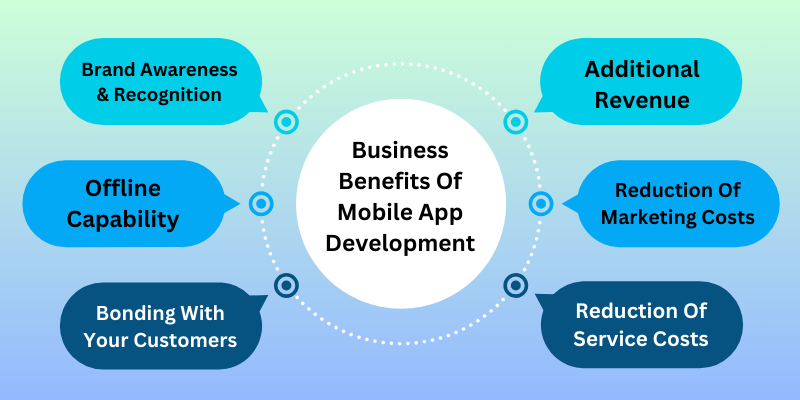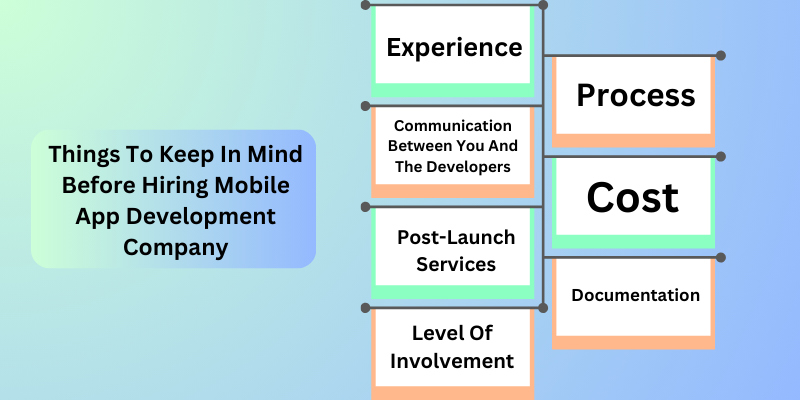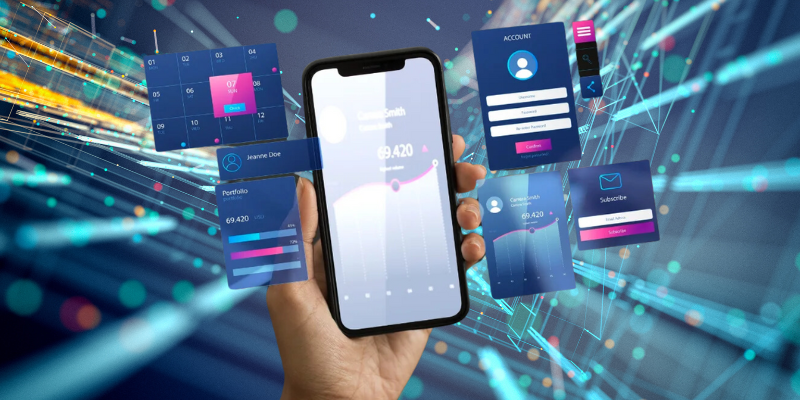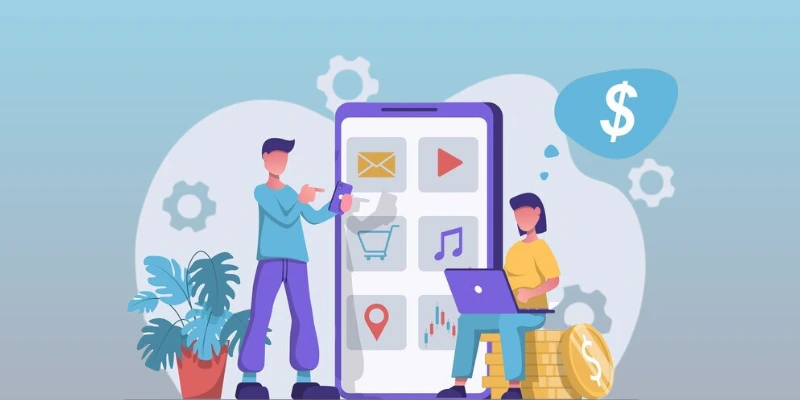Mobile apps can be very effective for companies wishing to scale and grow. Mobile app development can be an excellent career choice for those who want to join the growing industry. It can be a lucrative job option if you plan on developing apps. But developing apps isn't for everyone. You must, therefore, be aware of the subject's intricacies before heading into the Custom Mobile App Development.
In the past few times, the methodologies and strategies of mobile app development have changed dramatically. Thanks to increased connectivity to networks and capabilities for processing, the apps have evolved in line with technology, as has the development of apps. If you've been looking for a mobile application development manual that incorporates modern development techniques, the most advanced technologies of the future.
Understanding Mobile Application Development
Application development for mobile devices involves creating software that runs on mobile phones. Although it shares many features with traditional programming, mobile app development is unique in its own ways. For instance, mobile app development is the process of creating a user interface designed for mobile devices and taking into account different operating systems.
When developing mobile apps, developers must consider various device attributes and functions. Whether developing native applications specifically for particular operating systems, such as Android, or apps for cross-platform use that can be used across multiple operating systems. Each method has the same set of problems and opportunities.
Also Read: An Overview of Custom Mobile App Development Process 2024
The Growing Importance Of Mobile App Development

Imagine living without an app on your mobile—it sounds like a dream. Mobile apps have become integral to everyday life. Be it ordering food, booking a taxi, or checking out the most recent information, an app can do it all. Have you ever considered the procedure behind creating apps? This is where mobile app development is a factor.
The development of mobile applications is an area that grows and constantly changes due to the constant need for efficient and innovative applications. With smartphone users increasing, the demand for app developers who can work on mobile devices is more significant than ever. As a mobile app creator, you can create applications on various platforms. It is possible to develop applications for the web that function effortlessly across different platforms.
Business Benefits Of Mobile App Development

Developing mobile apps is vital in a society that is becoming more mobile and digital. It is crucial because of the profound effects it can have on companies, people, and society in general. In light of several aspects, developing mobile apps is critical to today's technological world.
Brand Awareness & Recognition
One of the main advantages of Mobile Application Development is that it provides customers with brand recognition and interaction. In addition, by engaging with the market you want to reach regularly and regularly, you begin to earn confidence.
Additional Revenue
The higher the level of consumer demand, the higher percentage of them will be interested and pleased with your business and products. This is where mobile app development excels.
Offline Capability
This is the primary distinction between mobile websites and applications. While apps might require connectivity to the Internet for most functions, they can still provide basic information and functionality for offline users.
Reduction Of Marketing Costs
Apart from the advantages of traditional digital marketing channels and data-driven and niche targeting, mobile apps are equipped with mobile-specific technology. They offer app creators an exclusive and powerful means of interacting with their users. Geo-targeting is a prime type of technology for mobile devices that is compatible with mobile applications. It lets mobile marketers know the target audience on a fine scale by tracking the location of users by using apps.
A custom mobile application development lets customers receive alerts and information at a moment's notice. It will help cut your advertising costs and create loyal customers who appreciate using the app.
Bonding With Your Customers
Chatbots and other tech that connect users to the internet in mobile apps enhance customer service by increasing customer trust and confidence. This is why bots can be particularly useful for jobs that involve answering common questions or guiding users through using the product.
Reduction Of Service Costs
Additionally, in addition to decreasing an employee's workload, the growth of mobile applications helps to cut down on the number of employees necessary to run a department. Tasks requiring ten people would now be only two with suitable mobile applications. One example of an easily automated job using mobile applications is chatbots that care for your customer support department. The way the process can be improved is carefully planned.
Also Read: Custom Mobile App Development vs. Off-the-Shelf Solutions: Which is Right for You
Types Of Mobile Applications
Developers are offered several alternatives to creating mobile applications. They can create native, web, or hybrid apps with advantages and drawbacks.
Native App Development
The process involves developing an application for one operating system - iOS, Android, or Windows. This development usually requires more time and can be more costly than other methods. However, it gives complete access to all the devices' capabilities and offers optimal user experience.
Cross-Platform App Development
It allows to build apps for multiple platforms using Cross-Platform Development Tools (e.g., iOS, Android, and Windows). This approach tends to be cheaper and quicker than native development. However, it has some disadvantages, like limiting access to device features.
Web Application Development
Web-based applications are generally created using HTML, CSS, and JavaScript and can be accessed through an Internet browser. They are typically used to develop mobile websites or smaller versions of desktop apps. They're relatively simple to make but not as robust in performance as native apps.
Hybrid App Development
Hybrid applications combine the best native and web-based applications, employing a container to wrap an application on the web in the native shell. This method can give users access to device features and is relatively simple to build. However, the performance may suffer because of the necessity of multiple levels of programming.
Mobile App Development Process
This involves the creation and design, the development process of testing, and the deployment of mobile applications. This can be a complicated and long-lasting process based on the features and complexity of the app in addition to the platform it's developed for. To successfully create an app for mobile, the Mobile App Developers must grasp the user interface and the platform requirements they intend to use. If they have a plan that is well thought-out and a clear vision, developers can design an app for mobile that will offer a fantastic user experience.
Idea Generation
Every app that succeeds starts with a brilliant concept. At this point, you decide on your idea for the app, determine your intended audience, and study the market to understand it. You should also consider the primary functions and features your app should provide.
Planning
Once you have defined your idea for an app, the next step is determining how to make that concept real. This involves delineating the functionality of your app in depth by creating wireframes or mockups of your user interface and deciding on the appropriate mobile platform and development method (native web, mobile, or hybrid).
Design
Design is an essential element of the mobile application creation procedure. It covers user interface (UI) and user experience (UX) styles. Designing well makes the app appear appealing and ensures its ease of use.
App Development
The app starts to shape. The development process involves writing the app, linking it to the backend service, and then testing it to ensure it works exactly as you expect.
Testing
When your application is ready to go live, it has been subjected to rigorous testing to discover and resolve any problems or bugs. This includes functional tests, usability tests for performance, and security tests.
Launch
When your app is carefully tested, and you're sure it's finished, it's time to release it in the app stores. This involves submitting your application for review on Google Play and Apple App Store.
Maintenance And Updates
However, your work needs to be finished once your app has been launched. It is essential to update the app to correct issues, include new features, and stay current with the latest mobile operating systems and hardware developments.
Reasons Why Mobile Applications Fail And How To Prevent Them?
Even though the mobile application development market is growing and attracting new customers, 90% of the apps still need to be successful. Why is this? How can you increase your chances of success? If an app does not work after a substantial amount of effort, time, and cash is spent developing it, the world is to blame. The failure to develop mobile apps goes far beyond a repairable bug fault. However, an array of issues could result in an app failing.
Awareness of these won't ensure that your application is immune from failure, but it could assist you in being more cautious and aware of warning signals. These are warning signs that something could go incorrect, and you can learn to prevent them before it is too late.
Your App Does Not Solve Problems
If your app is a copy of a popular app that isn't original, don't be shocked when no one uses it. A good app will solve a specific issue and provide customers with something other applications do not. However, if your goal is to compete with the market's top players, ensuring that your application has substantial advantages is essential. Be aware that profits should not be the sole goal of your app. Otherwise, your app may be unsuccessful.
Not Enough Research
If you create an app without conducting a user survey, you already know what users would like. Contact your friends, relatives, and people in the market you want to target to see if they'd be willing to use your app to test your ideas. To avoid this, it is essential to justify why your intended users will be awed by the app and collect data to prove that developing your app would have been a manageable amount of time.
Poorly Executed App Launch And Ineffective Marketing
Making an excellent first impression, highlighting the benefits of your application, and establishing an effective marketing strategy are the most critical factors in attracting new customers. To achieve this can lead to customers staying interested. The ability to demonstrate the primary functions of your application and ways to help them solve their issues is essential.
Its worth is highlighted on your social media, website ads, advertisements videos, and the description for your app store. Users will not be able to discover your application without a marketing strategy. Inquiring about user feedback and working out ways to make improvements in the future is essential to revoking your app and making updated versions.
Bad User Experience
Some people choose to remove or download apps when they're difficult or slow to use. If users aren't downloading your application, maybe, it's because of poor UI/UX design. UI design, commonly referred to as visual design, is closely related to the visual, while UX design is connected to users' thoughts about the application's technology. Your UI/UX design plan should be flawless when building a practical mobile application.
Lack Of QA Testing
The first error testers make is needing a basic understanding of mobile application MVP, MVC, and MVVM patterns. To improve testing quality, the QA team should work with developers in the early stages and gain knowledge about the technologies on which the mobile application will be developed.
To streamline the test process, prioritize test scenarios and procedures according to their needs and significance.
Also Read: Tips to Hire the Ideal Mobile App Developer for Your Project 2024
Things To Keep In Mind Before Hiring Mobile App Development Company

Starting mobile applications is relatively easy; however, promoting the mobile app is more vital. Therefore, mobile app developers on hire can assist you in focusing on your company's main points.
Experience
Examine the Mobile App Development Companies experiences and expertise. They typically have an IT qualification and should be able to demonstrate their expertise in developing software. It is important to inquire about their experiences developing apps that run on mobile devices for different platforms.
Process
People's perceptions about apps for mobile are affected by the design of their apps. Therefore, you should thoroughly review the design outline with mobile app developers. Determining whether the app has a friendly user template and secured codes is essential.
Communication Between You And The Developers
Building the perfect app is only possible if you are in contact with and coordinating with the app developers. In the end, sustaining the connection and maintaining constant contact during the development process is essential.
Cost
Consider the project's cost before signing off on it. This will help you manage your money and reduce costs.
Post-Launch Services
Proper and regular maintenance of mobile apps is essential. The app must be updated each day following its launch. The app can be updated to fix bugs or include new features to keep users entertained.
Documentation
You must be a signer of an NDS--non-disclosure contract. It's a legal document that states you own the source code, app, and contents. A contract is a guarantee of your app's safety. In addition, the prospective vendor can't bring legal action against the vendor, a potential buyer.
Level Of Involvement
An experienced web admin would use straightforward language to explain web technology and terms. They would avoid jargon that a user would not know. They would keep it clear and concise. Your website's design is the digital version of your business today in the digital age.
Mobile App Development Future Trends
Application development is constantly evolving, and keeping up with technology is vital. This section of this comprehensive guide will examine the more sophisticated elements of app development and future trends that may alter the landscape of mobile apps.
Enterprise Apps And Their Significance
Enterprise applications have gained popularity in the business world. They are created to aid businesses in managing their operations more efficiently. Many companies are turning to mobile app developers to create customized enterprise apps to simplify their business processes, which range from project management to customer relationship management (CRM). Being an app developer who knows the specific requirements of businesses can make you stand ahead of other marketplaces for app development.
Understanding The Importance Of App Store Delivery
Distribution is critical when creating mobile applications; each store offers different rules regarding app submission. Preparing your application for submission is a crucial part of application development. This involves generating the app's installation package and description documents and creating attractive icons. Keep in mind that how your app appears to the stores that sell apps will have a significant impact on its popularity.
The Role Of Remote Computing Resources
Due to the growth of cloud computing, app developers can design only some elements of their application entirely from beginning to finish. Backend services, or the computing infrastructure of remote locations, can manage many features, such as data storage, user authentication, and push notifications. Implementing backend services will significantly decrease the amount of time necessary to create apps. This allows developers to concentrate on the overall user interface and user experience.
Cross-Platform Development And Progressive Web Apps
Cross-Platform Application Development that works on multiple platforms, such as Android and iOS, is becoming more well-known. Software development kits like Flutter and React Native enable developers to develop and release the same code across different platforms, saving time and energy. However, Progressive Web Apps (PWAs) are applications on the web that function as native apps, providing users with an authentic app-like experience within web browsing. The boundary between mobile and web apps is increasingly blurred as the web advances technology.
Conclusion
The field of mobile app development is ever-evolving, marked by the fusion of new concepts, precise design, and intricate programming. However, with a good knowledge of developing mobile apps, the process becomes more accessible and enjoyable. Making native mobile applications specially designed to work with specific operating systems requires a solid knowledge of each platform and its programming languages, such as Java and Kotlin for Android developers or Swift and Objective-C for iOS developers. In contrast, hybrid mobile apps developed using universal programming languages like JavaScript, HTML, and CSS provide the benefit of compatibility across platforms.
The key to an app's success lies in the concept behind your app. It must provide an original solution to the real issue encountered by the target market. The idea itself is the start. It must be supported by a properly planned and executed process for mobile development. From conception to the moment of launch, every step needs careful attention and experience. An effective team of app developers is an essential component of the process. An experienced team proficient in various programming languages and well-versed in the intricacies of various mobile operating systems can help bring an app idea to life. It will ensure the app runs efficiently and gives users an excellent experience.
The journey of creating mobile apps is exciting and full of opportunities and challenges. Suppose you have the right combination of an original idea for the app, a precise development method, a competent developer team, and a thorough understanding of the target operating system. In that case, you can develop an app that stands apart in a crowded market.













Share this blog